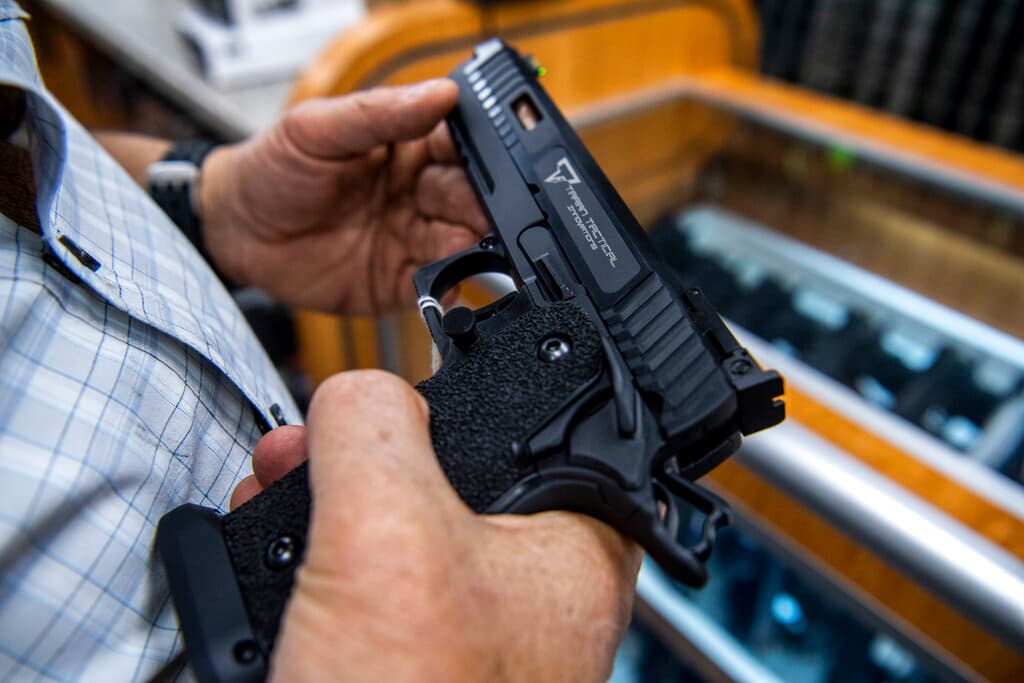Colorado Looks To Join Growing List of States Allowing Lawsuits Against Gunmakers
Repealing gun manufacturer liability protections are a key goal of the gun control movement.

A former New York governor, Andrew Cuomo, said the gun industry must face “death by a thousand cuts.” What followed was years of debate, lawsuits, and Supreme Court decisions. Now, after decades of fighting, gun control advocates have found a new strategy: go after the manufacturers themselves.
In a new front for gun control advocates, states are attempting to circumvent federal law so that individuals can sue gun manufacturers with greater ease. Colorado — a state that has long shielded the gun industry from lawsuits — is set to consider its own measure this year.
Three Democrats in the state legislature say they will soon introduce a bill to repeal a 20-year old law that protects the firearm industry from lawsuits. Senator Sonya Jaquez Lewis, the lead sponsor, said the goal is to protect those who sue the industry from hefty court fines and legal fees when they lose.
The goal is to “not punish gun violence victims if they want to go to civil court. It evens the playing field so that industry, those businesses, will just be put on the same playing field as every other business,” Ms. Jaquez Lewis told the Colorado Sun.
The president of the Crime Prevention Research Center, John Lott, told The New York Sun that laws like that proposed in Colorado will do nothing to stop crime and will infringe on manufacturers’ right to engage in lawful commerce.
“People could sue manufacturers and sellers whenever a crime, accident, or suicide occurs with a gun,” Mr. Lott said. “The straightforward result would be to put gun makers out of business. Should Ford or GM be sued when car accidents occur because a driver isn’t paying attention or drives recklessly, perhaps under the influence?”
The Protection of Lawful Commerce in Arm Act, which was passed by Congress in 2005, shields the gun industry from most civil liability cases. Critics of the law say it bars families from seeking justice in the form of monetary compensation.
The PLCAA followed a 2000 law adopted by Colorado that banned lawsuits against the gun industry for “physical or emotional injury, physical damage, or death caused by the discharge of a firearm or ammunition.”
Colorado only permits lawsuits if a manufacturer or seller transfers a firearm that is defective. The law was passed when Republicans controlled all branches of state government. The law also states that if someone brings a lawsuit against the gun industry and loses, that person is responsible for the defendants’ court and legal fees, which can amount to hundreds of thousands of dollars.
Two Coloradans, Lonnie and Sandy Phillips, sued gun manufacturers for damages after their daughter was killed in the 2012 Aurora theater shooting. After a judge dismissed their case, they were responsible for $200,000 in fees and had to file for bankruptcy, according to the Colorado Sun. Ms. Jacquez Lewis and her colleagues want to reduce that kind of risk for others.
Repealing gun manufacturer liability protections is a key goal of the gun control movement. New York, New Jersey, and Delaware passed gun liability laws in 2021. California did the same in 2022. At a bill-signing ceremony last year, Governor Newsom said that “nearly every industry is held liable when people are hurt or killed by their products — guns should be no different.”
Buffalo became the first city to sue under the New York law, claiming that the gun industry’s marketing and distribution practices have contributed to the city’s rising crime rates. Mayor Byron Brown said Buffalo has “suffered too much and for too long from gun violence” as a result, in part, of the work of gun manufacturers.
Should it go into effect, the Colorado law will likely face legal challenges. Gun rights groups sued New York state over its liability law, arguing the PLCAA “expressly preempts ‘qualified civil liability action.’”
Judge Mae D’Agostino of the Northern District of New York dismissed the lawsuit, saying in her decision that the state’s gun liability law did not preempt the federal statute.
Democrats in the Colorado legislature have introduced a number of new gun restrictions this year, including strengthening their “red flag laws” and banning so-called assault weapons — something the Democratic governor, Jared Polis, does not support.

